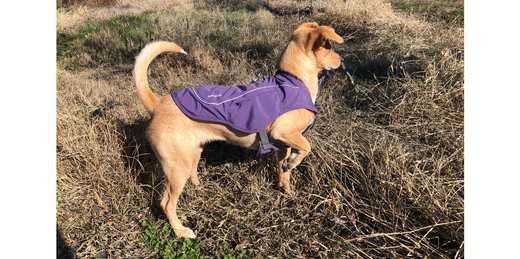
7 Olive Oil Health Benefits for Dogs
Medical Science & Canine Health
Everything I've read indicates that olive oil provides up to 7 health benefits for dogs. Here's what I've learned, and here's why I care.
Dogs are Omnivores
Dogs are omnivores, and this means they have the evolutionary capability to derive nutrients from a mix of both animal and plant sources. Modern pet owners, aware of this dietary potential, often choose to incorporate a range of healthy ingredients into their dogs' meals, and I've seen examples ranging from lean meats and organ meats to antioxidant-rich blueberries, heart-healthy flaxseeds, and fibrous green beans. There are a plethora of foods that can contribute to a balanced canine diet. One such beneficial addition, often overlooked but rooted in our own culinary tradition, is extra virgin olive oil.
Ginger's Story
Our rescue dog, Ginger (shown above in her spiffy harness) is a sturdy, bright, engaged, and energetic whippet-mix who exhibits classic whippet behavior: she's a sight hound who loves to run. Although she is in good physical condition she has developed an allergy to--of all things--nearly all of the most common animal proteins! Although she is very active, she's an elderly dog technically classified as geriatric, and we don't know if this has developed because she's nearly 15, or if this is a result of reaction to a bee sting after we adopted her. All we know is that she enjoyed commercial dog food in the decade before her adoption, and enjoyed both commercial and a veterinarian approved homemade dog food for months after she came to live with us. Thorough testing by our veterinarian indicated that inflammation and hair loss caused by a reaction to these proteins required a change to a hydrolyzed protein diet. So sad!
Boring!
As you might imagine, little dry brown pellets or stinky canned dog food left little room for variety, and these commercial "by prescription only" dog foods are very limited (two brands only, each with only one flavor). Treats, too, soon became just as boring for her. We worked to keep her interested by switching between brands and/or textures, and by switching between two types of treats; again, two brands, only one flavor each. We used a Kong® with peanut butter for her skin supplements as type of enrichment experience, and offered the occasional egg white or bite of fish as those are allowed in small amounts having registered as less reactive on her blood test.
Olive Oil to the Rescue
As it happens, Ginger loves extra virgin olive oil! While not as popular as peanut butter, it helps add interest to her dry food when mixed with a tiny bit of water and heated for 10 seconds in the microwave--just enough to reach doggie body temperature because we're trying to replicate freshly caught meat, right? This led me to read about olive oil and canine health and develop our own treat recipe which she's crazy about. You can find our recipe here: Golden Goodness Dog Biscuits.
7 Olive Oil Health Benefits for Dogs
I've organized these benefits starting with those that offer immediate, noticeable results, and progressing to those that have long-term implications.
IMPORTANT: Please keep in mind that not all information here applies to all dogs. Always consult with your dog's veterinarian regarding dietary needs.
1. Skin and Coat Health
- Why: A radiant coat and healthy skin are immediate, visible indicators of overall health.
- Source: British Journal of Nutrition 2013
- Explanation: Olive oil's monounsaturated fats may reduce dryness and scaling
2. Digestive Aid
- Why: Improved digestion is beneficial for dogs at any stage of life.
- Source: Journal of Animal Physiology and Animal Nutrition 2011
- Explanation: Olive oil can help facilitate a smoother digestive process, acting as a mild laxative, preventing or easing issues like constipation.
3. Immune System Support
- Why: Long-term health starts with a strong immune system.
- Source: anecdotal
- Explanation: Omega-3 fatty acids in olive oil are likely to support your dog's immune system, making it stronger against illness.
4. Joint Health
- Why: Vital for older dogs and larger breeds prone to joint issues.
- Source: Veterinary Journal 2007
- Explanation: The anti-inflammatory properties in olive oil can help alleviate joint pain. This study found that beagles with osteoarthritis fed a diet supplemented with olive oil had improved joint health and reduced pain
5. Brain Function
- Why: Cognitive health is crucial, especially for aging dogs.
- Source: no direct sources found; anecdotal evidence only
- Explanation: The healthy fats in olive oil contribute to better brain function, including improved focus and memory. "Direct canine studies are in early days, however, and are promising" was noted.
6. Heart Health
- Why: Important, however, this is often less immediately noticeable.
- Source: Journal of Veterinary Medicine 2009
- Explanation: Olive oil's healthy monounsaturated fats were shown to improve plasma lipid concentrations, including reduced levels of LDL cholesterol and triglycerides promoting a healthy cardiovascular system.
7. Weight Management
- Why: This is conditional; not all dogs require weight management.
- Source: anecdotal evidence referring to fats and oil's role in satiety
- Explanation: When used in moderation, olive oil can help regulate weight
Guidance on Quantities
Information about olive oil consumption for dogs is based on general guidelines commonly found in articles and advice from veterinarians, but not sourced from a specific academic study. These measurements are commonly recommended "dosages".
Small dogs (up to 20 lbs): up to 1 teaspoon per day
Medium-sized dogs (21-50 lbs): up to 2 teaspoons per day
Large dogs (50 lbs +): up to 1 tablespoon per day
These amounts are approximate and can vary based on the dog's overall diet, health status, and activity levels, and it's essential to note that olive oil is calorie-dense, containing 120 calories per tablespoon so the amount of olive oil should be adjusted to avoid exceeding the dog's daily caloric intake.
Consult your vet for personalized advice before adding olive oil to your dog's diet, especially if they have health issues or are on medication, as overconsumption can lead to digestive problems and weight gain.
Caveat
There is significantly more in vivo published and peer reviewed scholarly work on olive oil and human health than what is available for canines, so I'm still working to find citations for these commonly made claims. There is a significant amount of anecdotal evidence amongst real-world veterinary advice and scant scholarly citations. If you are a veterinarian, veterinary nutritionist or animal health researcher, I'd love to hear from you to continue to improve this post. - Liz





